
Hypercompe is a genus of tiger moths in the family Erebidae erected by Jacob Hübner in 1819.

Epicopeiidae is a family of insects in the order Lepidoptera. They are known as oriental swallowtail moths as they closely resemble some oriental swallowtail butterflies. Epicopeiidae have highly varied structure in regards to body size and wing shape. Epicopeiidaen wing patterns are involved in complicated mimicry rings.

Orgyia is a genus of tussock moths of the family Erebidae. The genus was described by Ochsenheimer in 1810. The species are cosmopolitan, except for the Neotropical realm.

Planorbidae, common name the ramshorn snails or ram's horn snails, is a family of air-breathing freshwater snails, aquatic pulmonate gastropod molluscs. Unlike most molluscs, the blood of ram's horn snails contains iron-based hemoglobin instead of copper-based hemocyanin. As a result, planorbids are able to breathe oxygen more efficiently than other molluscs. The presence of hemoglobin gives the body a reddish colour. This is especially apparent in albino animals.

Amastus is a genus of moths in the family Erebidae. The genus was erected by Francis Walker in 1855.
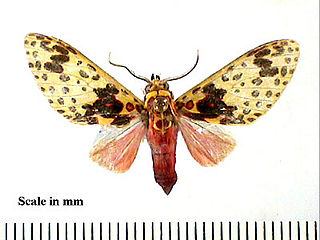
Amaxia is a genus of moths in the family Erebidae erected by Francis Walker in 1855. The type species of the genus is Amaxia pardalisWalker, 1855.
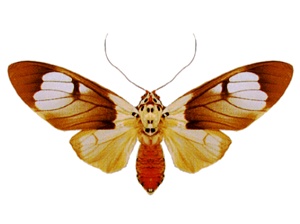
Amerila is a genus of moths in the subfamily Arctiinae.

Apantesis is a genus of tiger moths in the family Erebidae first described by Francis Walker in 1855. They are found in North and Central America.
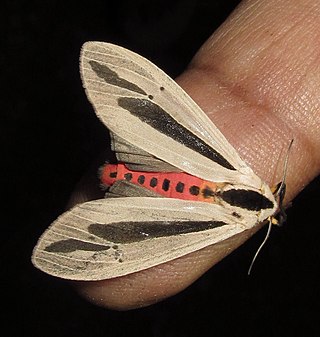
Creatonotos is a genus of tiger moths in the family Erebidae. The moths in the genus are found in the Afrotropics, South and East Asia, Sundaland and Australia.

Lophocampa is a genus of moths in the family Erebidae. The genus was erected by Thaddeus William Harris in 1841. It contains around 75 species.

Parasa is a genus of moths of the family Limacodidae. It was described by Frederic Moore in 1860.
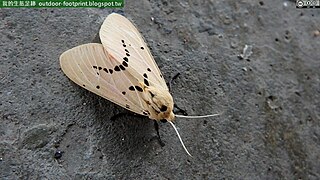
Spilarctia is a genus of moths in the family Erebidae. The genus was erected by Arthur Gardiner Butler in 1875.
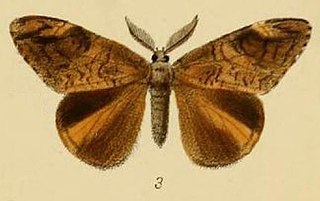
Aroa is a genus of moths in the subfamily Lymantriinae first described by Francis Walker in 1855. Species are distributed in South Africa, China, throughout India, Sri Lanka, Myanmar, and Java.

Melinoessa is a genus of moths in the family Geometridae erected by Gottlieb August Wilhelm Herrich-Schäffer in 1855.

Oreta is a genus of moths belonging to the subfamily Drepaninae. The genus was erected by Francis Walker in 1855.
Afraloa is a monotypic tiger moth genus in the family Erebidae erected by Vladimir Viktorovitch Dubatolov in 2006. Its only species, Afraloa bifurca, was first described by Francis Walker in 1855. It is found in Cameroon, the Democratic Republic of the Congo, Equatorial Guinea, Gabon, Ghana, Kenya, Nigeria, Sierra Leone, the Gambia, Togo, Uganda and Pakistan.
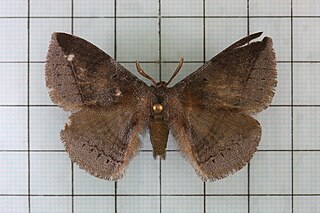
Ganisa is a genus of moths of the family Eupterotidae first described by Francis Walker in 1855.

Somera is a genus of moths of the family Notodontidae. The genus was erected by Francis Walker in 1855.
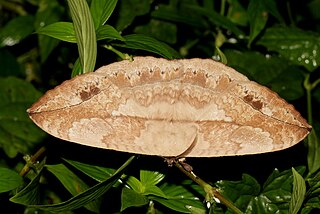
Eupterote is a genus of moths in the family Eupterotidae. It was first described by Jacob Hübner in 1820.

Doratifera is a genus of cup-moth caterpillars in the family Limacodidae. The genus was erected by James Duncan in 1841. There are about 13 described species in Doratifera, found primarily in Australia. They are called cup-moths because of the shape of their cocoons. In the species Doratifera vulnerans, the venon has a complex structure having 151 different protein-based toxins produced from 59 distinct protein families. The venom can be used in pesticides and drugs.


















